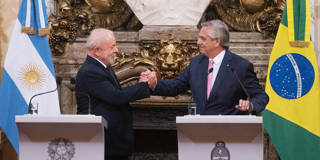Getting to Monetary Integration in Latin America
Brazilian President Luiz Inácio Lula da Silva and his Argentinian counterpart, Alberto Fernández, have advanced a vision of a shared unit of account for Latin America. The goal is achievable, as long as leaders heed the lessons of economic history – in particular, the evolution of the European Currency Unit.

SÃO PAULO – Brazil and Argentina have announced plans to launch technical studies aimed at laying the groundwork for greater regional financial integration, with the ultimate goal of creating a common currency, called the “sur” (south). While the goal may seem distant, it is far from impossible.